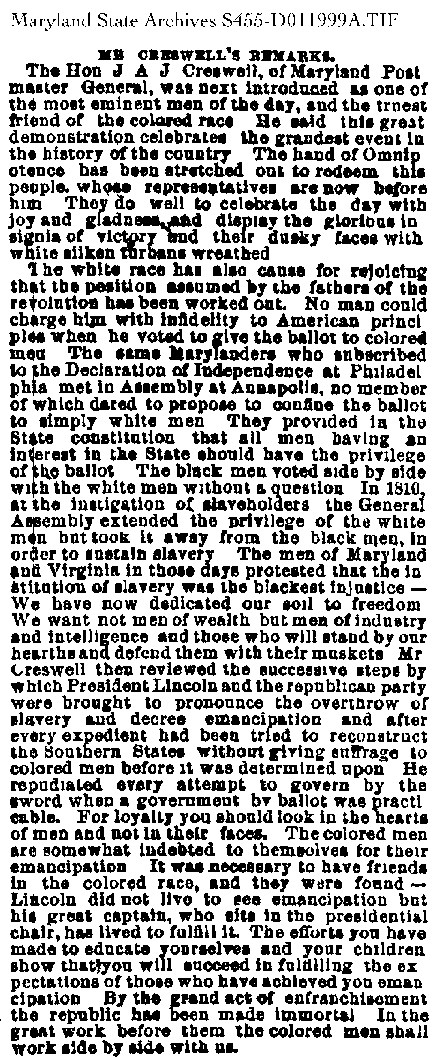

The Hon J A J Creswell, of Maryland Postmaster General, was next introduced as one of the most eminent men of the day, and the truest friend of the colored race. He said this great demonstration celebrated the grandest event in the history of the country. The hand of Omnipotence has been stretched out to redeem this people whose representatives are now before him. They do well to celebrate the day with joy and gladness and display the glorious insignia of victory and their dusky faces with white silken turbans wreathed.
The white race has also cause for rejoicing that the position assumed by the fathers of the revolution has been worked out. No man could charge him with infidelity to American principles when he voted to give the ballot to colored men. The same Marylanders who subscribed to the Declaration of Independence at Philadelphia met in Assembly at Annapolis, no member of which dared to propose to confine the ballot to simply white men. They provided in the State constitution that all men having an interest in the State should have the privilege of the ballot. The black men voted side by side with the white men without a question. In 1810 at the instigation of slaveholders the General Assembly extended the privilege of the white men but took it away from the black men, in order to sustain slavery. The men of Maryland and Virginia in those days protested that the institution of slavery was the blackest injustice –We have now dedicated our soil to freedom. We want not men of wealth but men of industry and intelligence and those who will stand by our hearths and defend them with their muskets. Mr. Creswell then reviewed the successive steps by which President Lincoln and the republican party were brought to pronounce the overthrow of slavery and decree emancipation and after every expedient had been tried to reconstruct the Southern States without giving suffrage to colored men before it was determined upon. He repudiated every attempt to govern by the sword when a government by ballot was practicable. For loyalty you should look in the hearts of men and not in their faces. The colored men are somewhat indebted to themselves for their emancipation. It was necessary to have friends in the colored race, and they were found –Lincoln did not live to see emancipation but his great captain, who sits in the presidential chair, has lived to fulfill it. The efforts you have made to educate yourselves and your children show that you will succeed in fulfilling the expectations of those who have achieved you emancipation. By the grand act of enfranchisement the republic has been made immortal. In the great work before them the colored men shall work side by side with us.